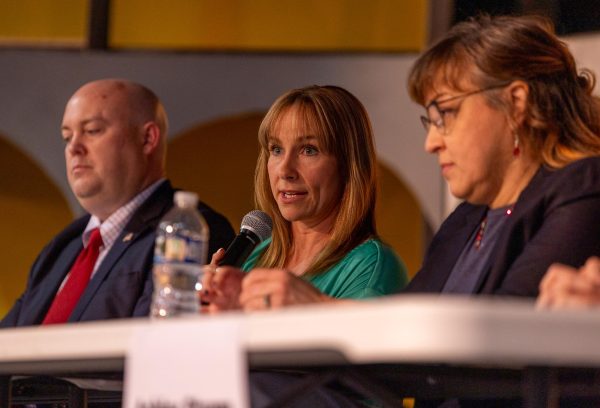Free ACT offered to juniors
FHSD will provide funding for all juniors to take ACT in April.
Last Wednesday, juniors were taken into the auditorium for information regarding the ACT. They were met with the news that this year the Francis Howell School District would be paying for all the juniors to take the ACT in April during the school day. Additionally, the state has agreed to pay for each junior to take the ACT one time in the spring of their junior year.
Guidance counselor Mr. Tim Holmes sees this as a good decision because of students’ apathy towards EOCs.
“The state does it next year, turning it into an EOC, which is smart because then students will take it seriously,” Mr. Holmes said. “A lot of students are like who cares about EOCs?”
The ACT provides more of an incentive to many students to give more effort compared to EOCs, which could help increase FHC’s scores, according to Mr. Holmes.
“To me, students will try harder on this one, because it means something for them,” Mr. Holmes said. “With EOCs, the average student does not care. They are like ‘it doesn’t matter’. Students do not know that it can be used for Cum Laude and for honors. They just do it [EOCs] and go through the motions, which can affect our scores because of their efforts. This will be good I think.”
And students have responded positively to the new addition as well. One such student is junior David Beecher, who sees the opportunity as beneficial to let all students demonstrate their abilities.
“The idea is good for the students that cannot afford it, because they can still see what they are made of,” Beecher said.
Mr. Holmes mirrors the thoughts of Beecher and believes that the new addition could lead to more students going to college after high school. By making and paying for all juniors to take the test, students might be more interested in going to college if they get a higher score than they thought.
“The benefit of offering it for all juniors is let’s say someone is not really excited about going to college and then they get a 23,” Mr. Holmes said. “Then, they might be excited for it. The hard part is that it will hurt the school’s average score since everyone will have to take it. But if one person decides to go to college, then it is more than worth it.”
To junior Isabelle Muich, the addition is a good use of money and will definitely pay off in the future.
“I think it is a great idea, because it is educational and a good use of the tax dollars that we are using to pay for it,” Muich said. “We are a lot more comfortable at our own school, too.”
Questions on why the school district has chosen to pay for the juniors to take the ACT, rather than simply wait a year for the state to fund it, have arisen. Mr. Holmes believes that the district had not known about this earlier.
“I don’t think the school district knew (that the state is going to fund it next year),” Mr. Holmes said.” If they would have known, I think they would have waited. This has been something that has probably been in the planning. The prep class was the beginning, helping students get good practice and exposure to the ACT. Then, they sprung this on us.”
Another nuisance is the day the ACT will be offered– in the middle of EOC testing. The decision was made because the school district was only given two days from ACT– one of which was during spring break, leaving the district no choice but to schedule this one. Juniors will skip EOCs for that day and then resume testing the next day. This to many, both students and teachers alike, just adds more stress that comes with more testing. Mr. Holmes believes that this could negatively affect scores on both the ACT and EOC.
“They [test scores] could be worse with more stress,” Mr. Holmes said. “Asking someone to do more of these testing things gets old. Attitudes change and people get bored. They could be brain-dead with the end of the school year.”
Beecher sees the scheduling as a little troublesome; however, he believes the positives definitely outweigh this miniscule problem.
“It could be a distraction, because kids could start thinking about the ACT more than the EOC, but I mean they have to do it sometime,” Beecher said. “Doing it first semester while people are in the summer mode probably is not a good chance for them to show what they know. Something has to give. And if it is during EOC testing then it is during EOC testing. We’ll just have to deal with it.”
With the new addition of a state-funded ACT test comes the deletion of PLAN and EXPLORE tests previously given to eighth graders and sophomores. The ACT has discontinued these two tests, and in its place, FHC will give freshmen and sophomore released ACT tests for practice.
In addition, with the ACT as an EOC test for the state next year, students can say good-bye to taking so many EOCs, as the state has decided to dwindle down to one EOC per core subject.
“The state is going to start requiring less EOCs, which I think is about time,” Mr. Holmes said.
Your donation will support the student journalists of Francis Howell Central High School. Your contribution will allow us to purchase equipment and cover our annual website hosting costs. FHCToday.com and our subsequent publications are dedicated to the students by the students. We hope you consider donating to allow us to continue our mission of a connected and well-informed student body.







